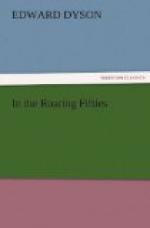Baffled here, Jim o’ Mill End turned greedily to the fount of wisdom seeking justification for his deep contempt for his fellows, corroboration of his opinions as to the stupidity, ignorance, and vileness of mankind, He read greedily, finding justification everywhere. Poets, philosophers, novelists, historians—they had all found man out, just as he had done. Discovering an echo of his beliefs, he thrilled with hot delight. He met allies amongst the poets, and adored them. It is strange how sympathetic books drift to the hand of a reader possessed with a consuming idea; how they gather around him, fall open to his eye, and give up the thing he yearns to feed on. Without the knowledge necessary to selection, Jim had an affinity for books of pessimistic doctrine, and though both means and opportunities were limited, he gathered together, in the course of two years, quite a library of precious volumes, and he came forth from these an intellectual giant refreshed. He saw Chisley on a plane far below him, a sink of ignorance, and judged it like a god—or a boy. Whatever Chisley respected he found excellent occasion to despise; whatever it revered he discovered to be false and contemptible. His sense of superiority was magnificent; it gave him a glorious exultation. A few hot words with the clerical caretaker of the Chisley conscience over the question of Sabbath observance exposed the young man—the gaol-bird—as an infidel and a scoffer. Jim was no infidel, but communities like Chisley do not under stand subtle distinctions in theology. Here was fresh occasion to fear and abhor Jim o’ Mill End; here was justification for many evil prophecies.
For a time Jim revelled in his great moral superiority and dreamed dreams. But the gnawing impatience returned—the unrest, the craving for something he could not define, but which always merged itself into his great grievance. He lived alone. At his work—which he obtained readily, for he was strong and efficient, and gave double value for his wages—he had no mates. Girls he had seen grow up from babyhood developed into beautiful creatures, with miraculous eyes, round limbs, and cheeks so red, so tender, that their soft ripeness haunted his dreams. Under cover and in secret he would watch them pass or at play with a throbbing heart and a passionate hunger for companionship, and discover himself doing this with something of a shock, ashamed of his interest in his enemies, resentful of all emotions that ran counter to his cherished antipathies.
When the news of the discovery of fabulous gold deposits in far Australia reached Chisley, Jim had thoughts of a new life in a new land: he craved for a wide field and a wild life; nothing withheld him but pride, the egotism that would not permit of his abandoning a struggle even with men so contemptible as these ignorant villagers. But the hunger for humanity filled him with visions of a new society in which he would be one with his fellow-men, and then his enemies seemed so pitiful that he knew himself for fool and blind to waste a care upon them. So he sold the small property at Mill End, took up his few belongings, and left Chisley quietly by night, eager to leave all the old life behind him, anxious for the new.




